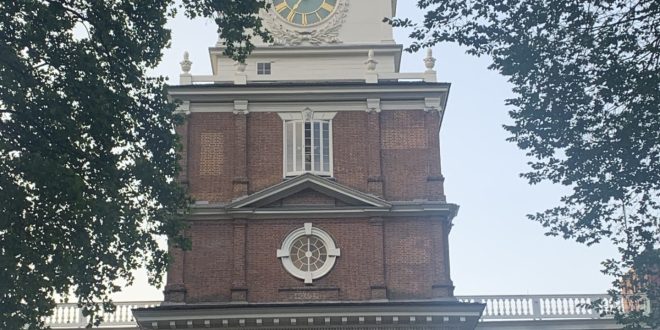As Americans, we are taught that we have an inalienable right and responsibility to free speech written into our Constitution. However, many students are unsure of how to use this right to change the world for the better. One group that is well-versed in their First Amendment rights are journalists, but even they need a push in the right direction.
That’s where F.I.R.E. comes in- the Foundation for Individual Rights and Expression.
Founded in 1999 under the name The Foundation for Individual Rights in Education, F.I.R.E. has since grown to be a national organization dedicated to their mission of protecting free speech in America. Their earliest mission was to protect and educate collegiate journalists in their rights as press, and that is still something they keep as a large part of their work.
My colleagues and I were invited to join them over the summer in Philadelphia, Pennsylvania for a national conference of student journalists, and another colleague and I took the opportunity to fly out to join them. F.I.R.E. helped to fly us out, as well as assisting in inter-city travel and lodging costs. It was a weekend trip, with a one-day conference held in the WHYY building, an affiliate of NPR and PBS.
During the event, we were taught about our rights and responsibilities as journalists, not just on a collegiate level, but on the same level as professionals who have been out in the field for years. This included seminars on how to deal with issues such as mass protests, reporting sexual assault cases, and how to handle a situation in which a student publication is ignored or even if funding is cut due to the content of the publication.
We were given a tour of the WHYY building, where we were shown the inner machinations of a professional-grade newsroom. It was, to me, incredible; being able to see how they were set up, seeing the way everything worked in tandem with each other, and realizing that this is something that I wanted to continue to do. We were even shown the recording studio of “Fresh Air with Terry Gross,” including her schedule for the week and her signed poster from working on “The Simpsons.”
In the end, though, here is what resonated:
First, the opportunity to network. I was thrown into a brand-new situation, with nobody familiar except for one coworker, and put at a table with people from all over the country. There were students from across the country, students from high-profile universities and even Ivy League schools, all sitting at the same table as me. And after taking the day to learn with these students, eating and laughing and discussing life where we’re from, it made me realize that I’ve been thinking about networking wrong: this was networking, just learning about other people and the work they do, and keeping in touch once we left. It was relieving, and it left me hopeful.
Second, the seminars. With the protest seminar, we learned how to effectively report without being caught in the “kettle” of police, and how to react during a potential arrest. Even if you make yourself known as the press, with all of your equipment, police will still arrest journalists. Part of the seminar was also on your rights and responsibilities, and what the school board can and cannot do when it comes to a student’s first amendment right.
Last, the keynote speaker. We had the opportunity to listen to Emily Bloch, a reporter with the Philadelphia Inquirer, talk about her experiences with her start and how she broke into the industry. She has written for publications such as Teen Vogue, Cosmopolitan, Rock Sound, and more. Her speech on the challenges of the industry and how she made it to where she is today was inspiring and comforting to hear as a college journalist, especially how she has been bouncing around with different publications despite her relative success in one magazine or newspaper.
I got the chance to ask her about that, and when she knew it was time to leave a certain publication despite her success. She had not been in Philadelphia for a year by the time she spoke to us and was leaving an over three-year career in Florida.
Her advice? “I think it’s time to leave when you know you have nothing else to learn from that job. When I’ve learned all that I can from one place, I go to the next.”
That stuck with me; the idea of staying in just one place and having to find the “perfect place” was something I was considering too much. It shifted my view of what it meant to have a career, and that I wasn’t trapped in one situation or one plan. I had options.
I left the event with a new focus and have taken everything I’ve learned from it and applied it to my work here at The Spectator. I’m much more confident in the work I put in after everything I learned during it, not only during the seminars, but just by reading and listening to the work of others.
Written by Bailey Wilson, Campus Life Editor. Photo courtesy of Bailey Wilson.
 The Spectator The independent student newspaper of Valdosta State University
The Spectator The independent student newspaper of Valdosta State University







